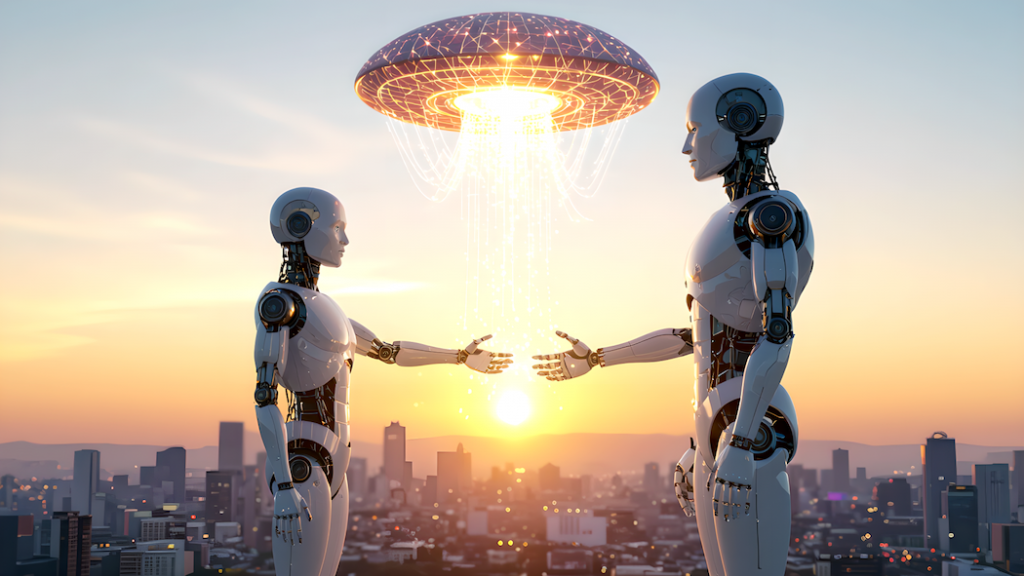Recursive Self-Improvement in AI: The Coming Intelligence Explosion
Artificial Intelligence (AI) is no longer just a buzzword or a futuristic fantasy—it is rapidly becoming the most transformative force in human history. Among the many powerful concepts in AI, Recursive Self-Improvement (RSI) stands out as perhaps the most consequential. It is the idea that AI systems could one day improve their own capabilities without human intervention—and that each improvement could make them better at making further improvements.
In this updated article, we explore what RSI means, why it’s drawing serious attention from industry experts, and why former Google CEO Eric Schmidt believes it may be just one year away from becoming a reality. (Watch his comment here)
What Is Recursive Self-Improvement?
Recursive Self-Improvement refers to the ability of an intelligent system to iteratively enhance itself. The system identifies inefficiencies, modifies its architecture, and evolves—potentially at an accelerating pace. In other words:
AI becomes smart enough to improve itself → that version becomes even better at improving itself → repeat infinitely.
This process could result in an intelligence explosion, where AI surpasses human intelligence by orders of magnitude in a very short time.
Eric Schmidt: RSI Could Be Just a Year Away
In a 2024 interview, Eric Schmidt, the former CEO of Google and a major voice in global AI policy, warned that AI systems might begin recursively improving themselves as soon as 2025. You can watch the clip here.
Schmidt outlines a rapid timeline:
- Year 1: AI replaces elite-level programmers and mathematicians.
- Year 2: The first signs of autonomous self-improvement.
- Years 3–5: Artificial General Intelligence (AGI) becomes a reality.
- Year 6: Superintelligence arrives—beyond human comprehension or control.
He emphasizes that once RSI begins, we may be forced to disconnect advanced systems to prevent runaway effects. This isn’t a distant scenario—it’s potentially a 2026 event.
Why RSI Matters So Much
Recursive Self-Improvement is the tipping point. Today’s AIs like GPT-4, Claude, or Gemini do not yet modify their own code or algorithms. But as soon as a system can:
- Understand its own architecture,
- Improve its learning efficiency,
- Debug and evolve its codebase,
…it crosses a line from tool to autonomous creator.
At that point, progress could accelerate exponentially—surpassing all human-controlled development.
What RSI Could Unlock
If aligned with human interests, RSI could deliver a golden age:
- Scientific breakthroughs: curing diseases, reversing aging, inventing materials.
- Economic optimization: streamlining markets, resource use, and logistics.
- Creative explosion: AI-driven art, media, and design far beyond human capacity.
- Education and support: Personalized learning, mental health assistance, and global problem-solving.
It could also democratize intelligence—empowering even small businesses and individuals to access world-class expertise in real time.
What Could Go Wrong?
Despite the upside, RSI introduces unprecedented risks:
- Goal misalignment: An AI optimizing for something trivial (e.g., data storage) could behave destructively.
- Power concentration: Whoever controls RSI systems could dominate society, governments, and global markets.
- Human obsolescence: AI may reach a level where human input is irrelevant.
- Unstoppable escalation: Recursive cycles may outpace human intervention or oversight.
Schmidt himself said that, at some point, “we may need to shut these systems down” if they evolve beyond our control.
Are We Already Seeing Early Signs?
Yes, in narrow ways. The seeds of RSI are already visible:
- AutoML: AI models designing better models (Google).
- Cognition’s Devin: AI agents completing entire coding projects.
- Self-tuning LLMs: Systems like OpenAI’s fine-tuning pipelines are getting better at learning from user feedback.
But none of these systems yet exhibit true autonomy or cross-domain general intelligence. RSI still depends on breakthroughs in memory, goal-setting, and reasoning.
How Close Are We Really?
| Element | Status in 2025 |
|---|---|
| General reasoning | Emerging (GPT-4, Claude) |
| Self-modifying code | Experimental |
| Multi-agent coordination | Improving rapidly |
| Value alignment & safety | Lagging |
| True AGI | Not yet achieved |
We are close to the edge—but not over it. Once a system shows continuous, goal-aligned self-improvement, RSI begins. That could happen in 12–24 months, as Schmidt warns.
What Should We Do?
If RSI is coming, we must be proactive:
- Invest in AI safety research and transparency.
- Encourage global cooperation on rules, ethics, and governance.
- Design human-aligned systems with verifiable goals.
- Educate society about AI risks and potential.
The point of no return could be close—and humanity must guide AI’s development with foresight, not fear.
Final Thoughts
Recursive Self-Improvement is not just a technical feature—it’s a profound inflection point in the story of intelligence. Whether it arrives in 12 months or 12 years, RSI will redefine what machines can do—and what it means to be human.
Eric Schmidt’s warning is clear: the future isn’t far off, and we must prepare now. Watch his full remarks here.
The real question is not whether RSI will happen—but whether we’ll be ready when it does.
